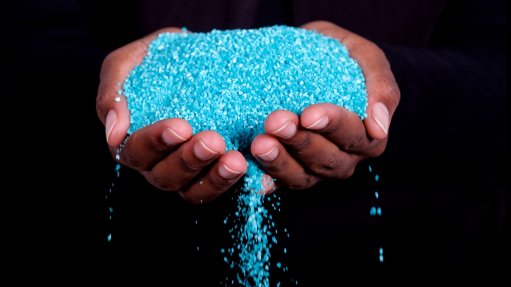
Nickel sulphate
African countries were determined to use the opportunity provided by the world’s need for the metals and minerals essential for the clean energy systems of the future to develop their economies through local beneficiation and the creation of value-adding industries. This was clearly signalled by Ministers of Mining from African countries, participating in a panel discussion during the Critical Minerals Africa conference, at the Cape Town International Convention Centre, on Wednesday.
Malawi Mining Minister Monica Chang’anamuno pointed out that Africa had lost a lot opportunities in the past, because raw materials had simply been sent out from the continent. “We need to have finished products [made] within Africa,” she affirmed. In the case of Malawi, the country would like to collaborate with other African countries to achieve this. For example, metals mined in Malawi could be processed in refineries established in Tanzania.
“We want to create jobs for our people,” stressed South Sudan Mines Minister Martin Gama Abucha. “We want to have value-addition.”
Tanzania was in the process of establishing refineries for key metals and minerals mined, or that soon would be mined, in the country, reported Deputy Minerals Minister Dr Steven Kiruswa. The country already had a gold refinery. Refineries for nickel and graphite would be set up. (A very large high-grade nickel reserve had been discovered, as had a large graphite reserve, and a rare earth reserve, in different parts of the country. All three mines were still in the development stage.)
He noted that the development of the critical minerals value chain depended on the development of partnerships. With partnerships, downstream sectors could be developed and African countries could become manufacturers of finished products. Africa had to be firm and ensure that it was able to develop local manufacturing, using local resources.
In Zimbabwe, a lithium salt processing plant was being set up, cited Zimbabwean Ministry of Mines and Mining Development Energy Minerals director Leon Godza. This was part of the country’s Mines-to-Energy industrial park project, and when it started operation in 2025, the plant would have a production capacity of 135 000 t/y. The total Mines-to-Energy park project would require a total investment of $13-billion (US) and would also involve the building of two 300 MW power stations as well as a graphite processing plant, a nickel chromium alloy smelter, a coking plant and a nickel sulphate plant.
As not all African countries would be able to have their own refining plants or smelters, regional cooperation would be essential, he noted.
“The future for critical minerals in Africa is very bright,” affirmed Godza. “The key for the development of Africa is collaboration, collaboration, collaboration.”